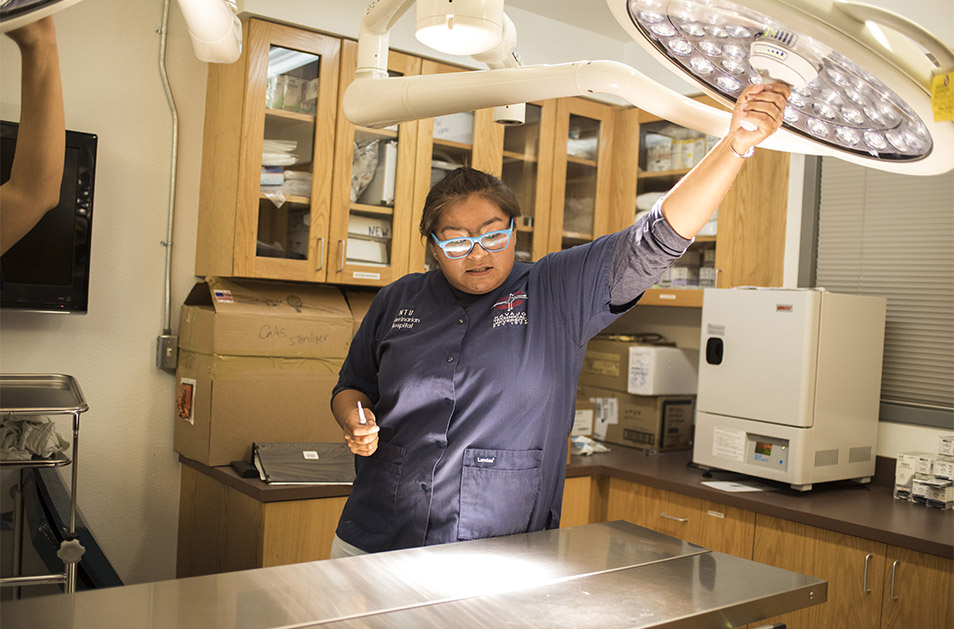About
NTU’s Veterinary Technology program offers an Associate of Applied Science degree and requires 68 credit hours with 50 credit hours of core veterinary technology instruction.
The program provides hands-on clinical and field experience in addition to formal classroom instruction. The curriculum focuses on duties and skills that enable students to pursue a career in animal health and other fields.
Accreditation
NTU's Veterinary Technology program is accredited by the American Veterinary Medical Association (AVMA). The AVMA accrediation will enable the NTU Veterinary Technician graduates to qualify for the Veterinary Technician National Examination (VTNE).
| Estimated Cost of Attendance | $16,022/academic year |
|---|---|
| Tuition and Fees | $2,402 |
| Room and Board | $6,920 |
| Books and Supplies | $2,600 |
| Transportation | $1,600 |
| Personal/Misc | $2,500 |
Veterinary Technician - NTU's Veterinary Technology program is accredited by the American Veterinary Medical Association (AVMA). The AVMA accreditation enables the NTU Veterinary Technician graduates to qualify for the Veterinary Technician National Examination (VTNE). The AAVSB owns and administers the VTNE.For specific credential information in each state is located through the AAVSB website: https://www.aavsb.org/public-resources/find-regulatory-board-information/.
| Veterinary Technician Program | ||
|---|---|---|
| POSITIVE LICENSURE & CERTIFICATION DETERMINATIONS | NEGATIVE LICENSURE & CERTIFICATION DETERMINATIONS | NO LICENSURE & CERTIFICATION DETERMINATIONS |
| NTU has determined that our curriculum meets the state educational requirements for licensure or certification in the state listed below. | NTU has determined that our curriculum does not meet the state educational requirements for licensure or certification in the states listed below. | NTU has not made a determination that our curriculum meets the state educational requirements for licensure or certification in the states listed below. |
|
Arizona, New Mexico, Alabama, Alaska, Arkansas, California, Colorado, Connecticut, Delaware, Florida, Georgia, Hawaii, Idaho, Illinois, Indiana, Iowa, Kansas, Kentucky, Louisiana, Maine, Maryland, Massachusetts, Michigan, Minnesota, Mississippi, Missouri, Montana, Nebraska, Nevada, New Hampshire, New Jersey, New York, North Carolina, North Dakota, Ohio, Oklahoma, Oregon, Pennsylvania, Rhode Island, South Carolina, South Dakota, Tennessee, Texas, Utah |
||
Program Advisor & Licensure Information:
Dr. Germaine Daye
Director of Veterinary Teaching HospitalFax: 505.786.4178
Email: gdaye@navajotech.edu
AVMA Contact:
Website: https://www.avma.org/
Phone: 800-248-2862
Fax: 847-925-1329
Diversity, Equity, and Inclusion Statement (PDF) Curriculum Outline (PDF)
Contact
If you are interested in the program or would like more information, please contact:
Dr. Germaine Daye
Director of Veterinary Teaching Hospital
Navajo Technical University
Lower Point Road, NM State Highway 371 & NN 9
PO Box 849
Crownpoint, NM 87313
Phone: 505.786.4150
Fax: 505.786.4178
Email: gdaye@navajotech.edu
Admission Requirements
New students are accepted into the Veterinary Technology program only in the fall semester, and only after a successful admissions interview. Students are required to maintain a 2.5 GPA, and complete all general studies requirements before starting veterinary technology coursework.
Mission Statement
The mission of the Veterinary Technology degree program is to provide students with the academic, professional “hands-on” knowledge, and skills required to master the American Veterinary Medical Association’s Veterinary Technology Student Essential Skills which will prepare students as entry-level veterinary technicians, to successfully pass the VTNE (Veterinary Technician National Exam), and to perform as effective veterinary health care team members. Students will exhibit conduct that reflects practice standards that are professional, ethical, and legal. Graduates of this program will recognize career opportunities in traditional and non-traditional settings such as private veterinary practice, biomedical research, industry, academia, food safety, government, zoos, and other animal health-related fields.
Program Goals:
- 75% of students will successfully pass (with a 70% score) the Veterinary Technician National Exam (VTNE) within the first two attempts at the completion of the Veterinary Technology program.
- Students will accomplish 100% of the Veterinary Technology Student Essential Skills pertaining to the courses by the end of the semester.
- Students will demonstrate an understanding of office and hospital procedures, client relations, and communication. Students will follow and uphold applicable laws and the profession's ethical codes.
- Students will safely and effectively administer prescribed drugs to patients. Students will accurately dispense and explain prescribed drugs to clients.
- Students will demonstrate and perform patient assessment techniques and demonstrate husbandry, nutrition, therapeutic and dentistry techniques.
- Students will safely and effectively manage, maintain and monitor patients under anesthesia.
- Students will understand and integrate all aspects of patient management and maintain asepsis for common surgical procedures.
- Students will demonstrate an understanding of laboratory procedures.
- Students will demonstrate an understanding of diagnostic radiography and non-radiographic modalities.
- Students will demonstrate and understanding of handling common laboratory animals used in research.
- Students will demonstrate an understanding of providing safe and effective care for avian, exotic, small mammals & fish procedures.
Practicum/Internships
After successful completion of the fourth semester, students are required to complete a 3 credit hour practicum in a veterinary clinic under the direct supervision of a veterinarian or credentialed veterinary technician. Students are also encouraged to apply for additional internships in other career areas — government, industry, education, humane societies, shelters, zoos, wildlife, military, or research after the second semester.
Employment Opportunities
The U.S. Department of Labor Bureau of Labor Statistic Occupational Outlook Handbook reports that the job outlook for this occupation is predicted to grow 30% between 2012 & 2022. Many veterinary technicians find employment in clinics, but other options include government, industry, education, humane societies, shelters, zoos, wildlife, military, and research. Veterinary Technicians can also achieve speciality certification in dentistry, anesthesiology, internal medicine, emergency and critical care, behavior, zoo medicine, equine nursing, surgical nursing, clinical nursing, nutrition, and pathology with further training.
Graduation Rate: (First cohort will graduate in December 2017)
VTNE Results
| July 1, 2020 - June 30, 2023 | |
| Number of first-time candidates that have taken the VTNE | 2 |
| Three-year VTNE pass percentage | 50% |
Program Staff:
Ms. Sharie Begay, AAS, Office Manager
Phone: 505.387.7410
Email: slbegay@navajotech.edu
Dr. Germaine Daye, Director of Veterinary Teaching Hospital & Land Grant Program
Veterinary Technology Program Advisor
Krystal Louis, RVT, Veterinary Technology Instructor, Program Advisor

